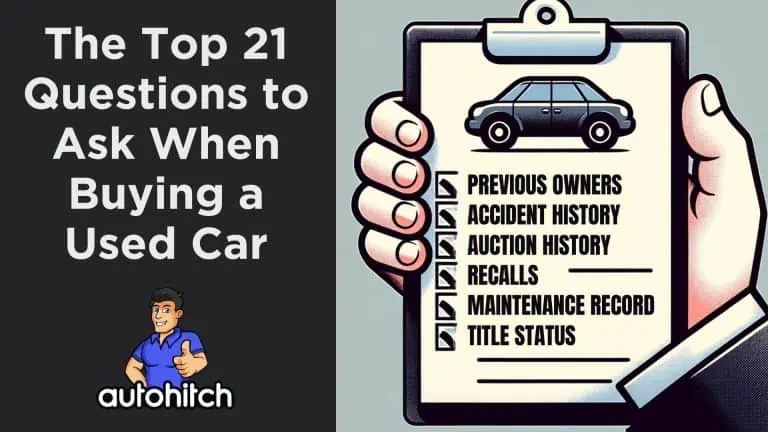The Top 21 Questions to Ask When Buying a Used Car
With many years of experience buying and selling used cars, I know how important asking the right questions is for finding a reliable pre-owned vehicle that fits your needs and budget.
In this guide I will explore the top 21 questions to ask when buying a used car, Questions I myself asked when I was a licensed dealer traveling the country buying cars at auction.
My hope is to help you avoid some of the mistakes I and many consumers make every day.
Table of Contents
Questions To Ask About A Used Car – History
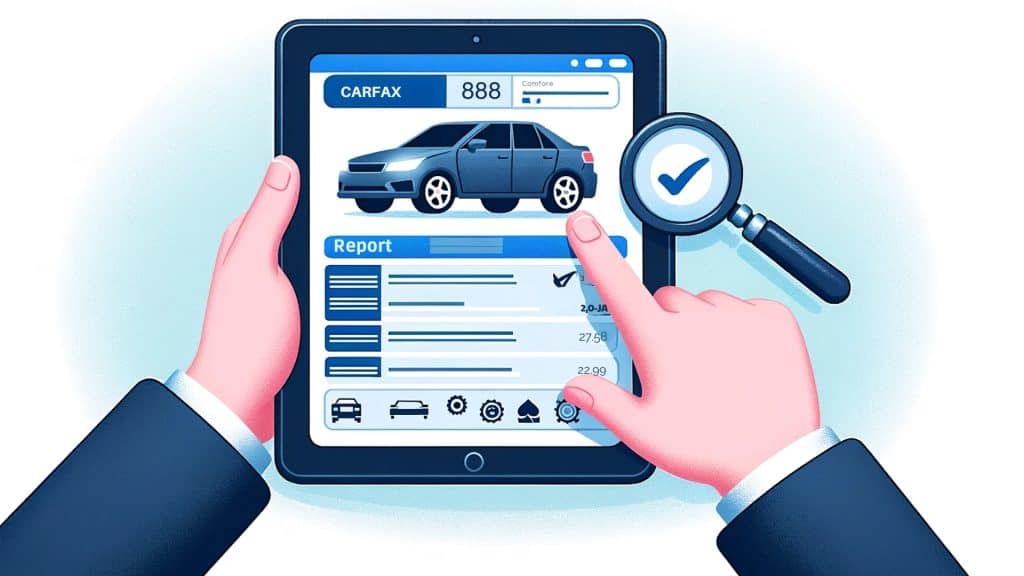
- Obtain a vehicle history report – Use the VIN to purchase a CARFAX or AutoCheck report. This provides an overview of the car’s accident history, title issues, service records, and number of previous owners.
- Ask about previous owners – Cars with fewer owners tend to be better maintained. Frequent ownership changes may indicate underlying problems.
- Inquire about accident history – Any accidents or damage? How were repairs done? Improperly fixed cars can pose risks.
- Check for open recalls – Use the NHTSA database to search for recalls requiring fix. Address outstanding ones for safety.
- Confirm maintenance history – Were suggested services done properly? Gaps in service may require catching up on needed maintenance.
- Compare mileage to car’s age – High mileage vehicles have more wear. Calculate average annual mileage based on age.
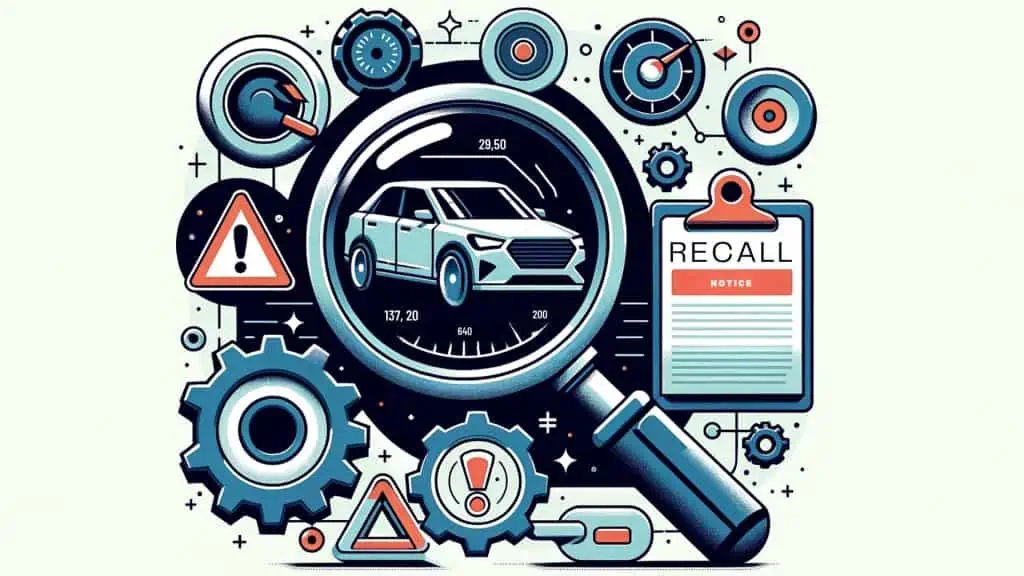
Researching factors like ownership, accident history, maintenance diligence, recalls, and typical mileage helps assess how a used car was treated over its lifetime. This informs negotiations and identifies potential issues needing correction.
Questions to Ask About Vehicle History
| Question | Importance |
|---|---|
| How many previous owners? | Fewer owners indicates better care |
| Any accident history? | Could indicate major repairs needed |
| Title status? | Avoid salvaged/rebuilt titles |
| Service records available? | Shows diligent maintenance |
| Usage history? | Personal vs rideshare usage differs |
Thoroughly Inspect the Car Yourself
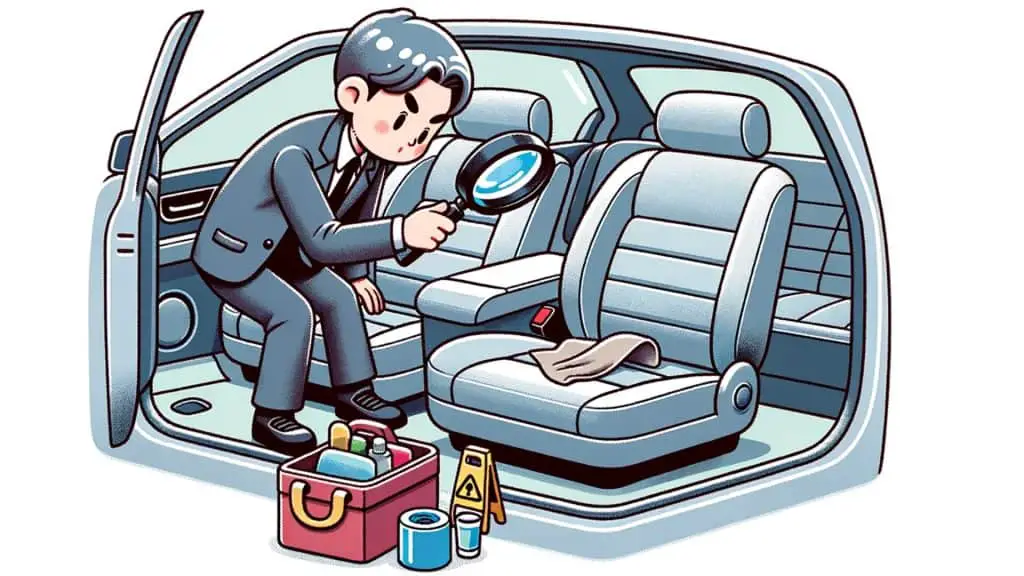
- Test drive the vehicle – Test acceleration, brakes, handling, and controls. Listen for odd noises.
- Assess exterior condition – Check for accident indications like uneven panels, overspray, mismatched paint.
- Examine interior wear – Look for ripped seats, stains, smells, pet hair indicating neglect.
- Request a mechanic’s inspection – $100-$200 for an expert pre-purchase inspection provides peace of mind.
- Review last service date – When was the oil last changed? Are new tires needed soon?
- Ensure spare tire/jack are present – Replacements can be expensive. Make sure they are in good shape.
- Check for warning lights on dash – Address any indicators for mechanical issues before finalizing sale.
Carefully inspecting the vehicle yourself and having a professional mechanic evaluate any issues provides first-hand experience with the car’s true condition. This allows you to make accurate assessments when negotiating with sellers.
Vehicle Inspection Checklist
| Inspection Item | What to Look For |
|---|---|
| Test drive | Listen/feel for issues, test brakes/acceleration |
| Exterior | Dents, rust, mismatched paint |
| Interior | Rips, stains, smells indicating neglect |
| Undercarriage | Leaks, damage, rust |
| Tires | Wear, age, mismatches |
| Lights | All working, lenses foggy/damaged? |
Ask About Warranties and Return Policies
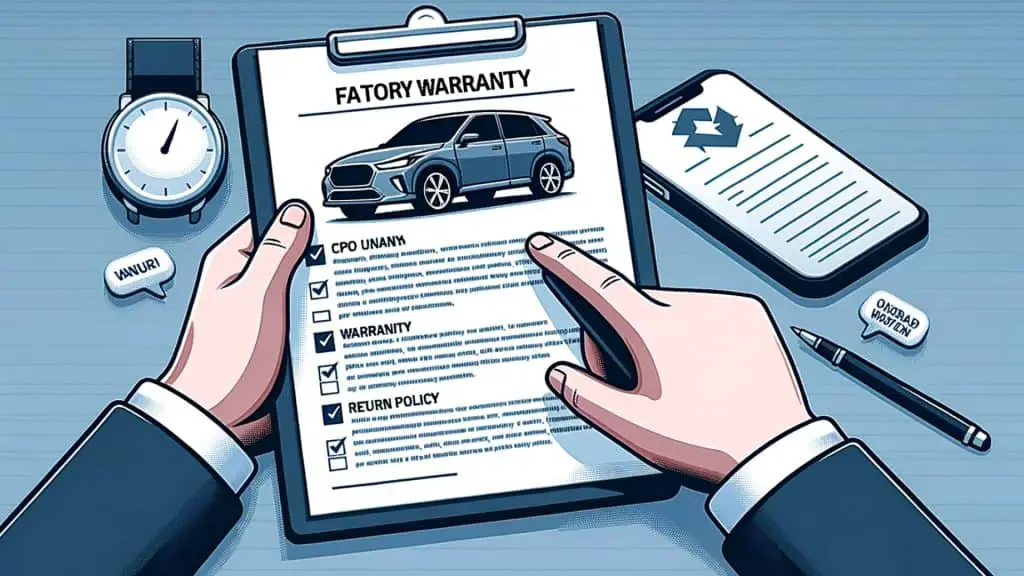
- Remainder of factory warranty? – Call manufacturer to verify coverage length remaining.
- Is this a certified pre-owned car? – CPO warranty adds protections once factory warranty expires.
- Does dealer offer a return policy? – Some allow returns within a few days if you’re not satisfied.
- What is the private seller’s disclosure? – Ask if the car is sold “as-is” and if issues exist.
- Are added protections like an extended warranty included? – Avoid buying expensive and often useless dealer warranties.
Understanding warranty coverage, seller disclosures, and dealer return policy protections allows buyers to evaluate risks being assumed with the used car purchase. After-sale surprises become less likely when these questions are asked ahead of time.
Negotiate Price After Doing Your Diligence

- Compare the asking price to fair market value – Research sites like KBB and Edmunds to gauge reasonable pricing based on factors like mileage, condition, features, and demand.
- Note any needed maintenance and estimate costs – Use inspection findings to negotiate for price reductions if repairs are needed.
- Assess impact on insurance – Price in any premium increases for the specific make and model based on quotes.
- Point out cosmetic flaws to ask for discount – Even minor issues like wear and dings give bargaining power.
- Offer less but be reasonable – Try offering 10% under asking price. But don’t lowball an otherwise fair price.
Doing diligent research allows buyers to negotiate used car pricing with confidence. Sellers will also respect a buyer who comes prepared with vehicle valuation data and inspection results.
Conclusion
Buying a used car that meets your needs and fits your budget is achievable with the right preparation. Asking smart questions provides insight into a vehicle’s history, identifies issues needing correction, and informs price negotiation. Test drive vehicles thoroughly, get professional inspections, and research fair valuations and ownership details. Take these steps and avoid costly surprises when buying your next used car.

